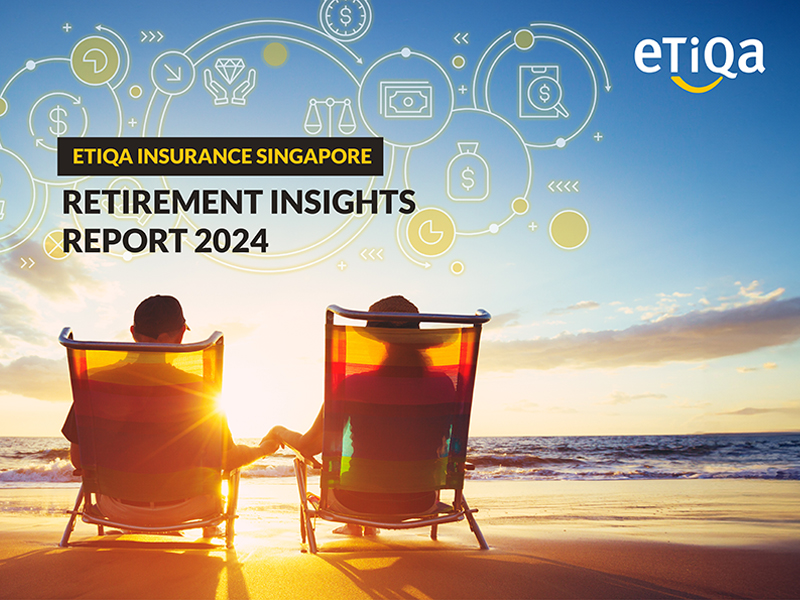Younger Singaporeans Aim for Early Retirement, Projecting Monthly Expenses Below S$6000
Majority of millennials and Gen Z anticipate retiring in their 50s but only start planning in their 30s
SINGAPORE - Media OutReach Newswire - 24 September 2024 - Most Singaporeans (81%) aspire to retire between the ages of 50 and 70, with younger generations, including millennials (71%) and Gen Z (71%), aiming for retirement at 60.75% of Singaporeans have prioritised planning for retirement, typically starting at age 35, according to the Etiqa Insurance Singapore Retirement Insights Report 2024.

Among younger Singaporeans, most millennials (75%) and Gen Z (69%) are confident that they will achieve their retirement goals. These generations anticipate requiring less than S$6,000 per month to sustain their retirement plans, with 57% of millennials and 74% of Gen Z expressing this sentiment.
These findings highlight Singaporeans' awareness of the need for a robust retirement plan, as the cost of living and inflation rates continue to rise. However, with many starting later in life and underestimating the funds needed to achieve their goals, there is a need to balance early retirement with the realities of financial planning.
"While it is heartening to see more Singaporeans take proactive steps towards preparing for retirement, many still underestimate the time horizon and funds needed to sustain their desired lifestyle. This could lead to a potential retirement gap," said Raymond Ong, CEO of Etiqa Insurance Singapore.
"It is key that Singaporeans start saving early and invest wisely. They should factor in the impact of inflation on their retirement savings, make necessary adjustments over time and ensure they have protection in place for unexpected events, such as accidents and medical issues, that could derail their plans. This proactive approach is essential to help them maintain their desired standard of living in their golden years," added Mr. Ong.
Evolving Financial Priorities Amongst Younger Singaporeans
Younger Singaporeans, including millennials and Gen Z, also adopt a conservative approach to retirement planning, with the survey also revealing their preference for low-risk financial instruments, with savings accounts (Gen Z: 61%/Millennials: 65%), CPF contributions (Gen Z: 56%/Millennials: 54%), and fixed deposits/savings bonds (Gen Z: 44%/Millennials: 52%) as their top financial tools to fund their retirement.
While this cautious approach might have been useful in capitalising on the high-interest rate environment of recent years, younger Singaporeans are encouraged to rethink their retirement strategy in today's uncertain economic environment to grow potential investment returns, increase their ability to accumulate sufficient retirement funds and leverage the power of compounding over time.
The report reveals that 1 in 3 seniors wish they had saved more consistently and aggressively. By learning from the experiences of older generations, younger Singaporeans can consider adopting a more proactive and growth-oriented investment approach to better secure their financial future.
The desire to secure the next generation's financial future is evident among younger Singaporeans, with 78% of millennials and 68% of Gen Z prioritising wealth transfer as part of their financial goals. While this desire to secure both their financial future and that of the next generation is good, it can inadvertently exacerbate the retirement gap for younger Singaporeans should it take precedence over their own financial security.
Other key findings of the survey include:
- 25% of Singaporeans have yet to start retirement planning. Top reasons include prioritising immediate financial needs (38%), reliance on CPF savings (34%), and insufficient savings (30%).
- 33% of seniors and 30% of Gen X acknowledge that consistent and aggressive saving could have significantly increased their retirement funds over time.
- 41% of Singaporeans consider investment as a key retirement strategy, but a third of those who invest lack confidence in their approach. Those lacking confidence in investing cite fear of losing money (57%), insufficient financial knowledge (53%), and high risk (45%) as their main concerns.
- Healthcare needs and expenses remain a key focus in Singaporeans' retirement planning, particularly for seniors (63%) and Gen X (51%), who are acutely aware of the costs associated with ageing. Additionally, insurance coverage is becoming a significant focus in retirement planning, with about 38% of Singaporeans prioritising it.
Etiqa Insurance Singapore Retirement Sentiment Study Report Methodology
The Etiqa Insurance Singapore Retirement Sentiment Study Report was conducted in collaboration with Kantar in June 2024, surveying 1,009 individuals across four age groups: Gen Z (18 to 28 years old), Millennials (29 to 43 years old), Gen X (44 to 59 years old), and Seniors (60 and above). This study delves into the attitudes and preparedness of Singaporeans towards retirement, providing valuable insights and guidance to help individuals unlock their retirement potential.Hashtag: #EtiqaSingapore
Etiqa Insurance Pte. Ltd.
Etiqa Insurance Pte. Ltd. (EIPL) is a life and general insurance company licensed and regulated by the Monetary Authority of Singapore and governed by the Insurance Act 1966. Having protected customers in Singapore since 1961 under the name United General Insurance Co. Sdn. Bhd., the company transitioned into the Singapore branch of Etiqa Insurance Berhad in 2009. Today, EIPL in Singapore stands as the pivotal operating entity of Etiqa Insurance Group, a leading insurance and takaful provider in ASEAN.
EIPL offers a comprehensive range of life and general insurance products accessible through its diverse distribution channels, including bancassurance, agents, brokers, financial advisers, partnerships, direct and online sales via Tiq by Etiqa. Etiqa is rated 'A' by credit rating agency Fitch for the group's 'Favourable' business profile. EIPL is owned by Maybank Ageas Holdings Berhad, a joint venture combining local market expertise with international insurance knowledge, with 69% ownership by Maybank, the fourth largest banking group in Southeast Asia, and 31% by Ageas, an international insurance group operating across 13 countries.

















